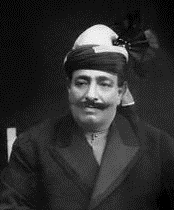Muhammad Khan Zaman Khan
This article may need to be rewritten to comply with Wikipedia's quality standards. (September 2023) |
| Muhammad Khan Zaman Khan Tanoli (محمد خان زمان خان تنولی) | |||||
|---|---|---|---|---|---|
| Nawab Nawab Shahib His Honourable Highness | |||||
 Portrait picture of Nawab Zaman Khan | |||||
| Reign | 1907–1936 | ||||
| Successor | Muhammad Farid Khan | ||||
| Born | 6 November 1874 Amb, Pakistan | ||||
| Died | 12 September 1936 Darband, Khyber Pakhtunkhwa | ||||
| Burial | 1936 | ||||
| |||||
| Dynasty | Tanoli[1] | ||||
| Father | Muhammad Akram Khan | ||||
| Religion | Sunni Islam | ||||
| Awards | |||||
| Military career | |||||
| Allegiance | |||||
| Rank | |||||
| Battles / wars | Battle of Chamla Fall of Baghdad (1917) Gallipoli campaign | ||||
Nawab Sir Muhammad Khan-i-Zaman Khan Tanoli[2] GCSI KCIE GCMG also known as Khan-i-Zaman Khan, was the ruling Nawab of the princely state of Amb from 1907 until his death in 1936 in his region Darband become a biggest trade market of India.[citation needed]
The son of Nawab Muhammad Akram Khan, whom he succeeded in 1907, the Nawab helped the British in carrying out several of the later Black Mountain expeditions to Kala Dhaka/Tor Ghar. In 1926 he sent a force which fought with the Wali of Swat at Chamla.[3]
He also make a cash contribute of 1 lac in order to build Islamia College University in visionary of Shahibzada Abdul Qayyum Khan.
He sent food, artillery, goods and reliance support to ottoman Khalil Pasha but due to alliance with British raj as an Indian princely state he was unable to take part or alliance with British or as well as Ottoman he remains himself and his army to make quietness in Fall of Bagdad (1917). Nawab had a good relationship with Ottoman Sultan and the extreme support to Ottoman Empire at a very difficult quite time was very reliable. As well as being a knight commander of the Order of the Indian Empire, the Nawab held the rank of Honorary Major in the Indian Army.[4]
From his timeas used in perpetuity by him and his descendants.[5]

References
- ^ "Ancestor Database - Tano Khel -.-> تنو خېل". Archived from the original on 26 September 2015.
{{cite web}}: CS1 maint: unfit URL (link) - ^ History and pedigree[permanent dead link]
- ^ Sir Abdul Wadud, (Wali of Swat) and Muhammad Asif Khan, The Story of Swat (1963), p. 143
- ^ The India Office and Burma Office List (1928), p. 154
- ^ Governor-General's Orders GGO NO. 51 of 1921, given at Simla, vide section B of the Gazette of India
